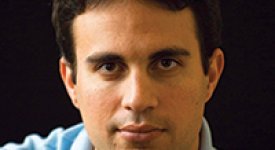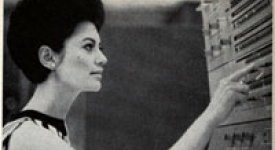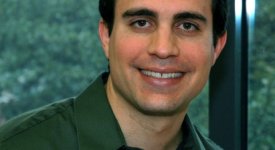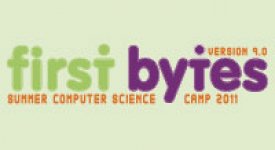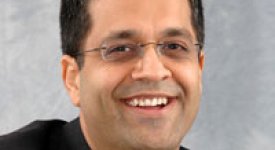Jump to navigation
08/05/2011 -
Microsoft Research has selected Assistant Professor Brent Waters as one of eight Microsoft Research Faculty Fellows of 2011.
Read More
07/28/2011 -
RoboCup Remix from Texas Science on Vimeo.
The video footage is from the second half of the championship game in the 3-D Simulation league in RoboCupSoccer 2011. UT Austin Villa won the game, 4-0, over a team from Changzhou Institute of Technology in China. The audio track is “humm ok,” by Gablé (Creative Commons).
Read More
07/28/2011 -
Today it's almost assumed that computer science is a field set aside for nerdy men. Writing at the blog of the programming firm Fog Creek Software, Anna Lewis, the firm's recruiting director, says it isn't so. In fact, in 1987, 42% of American programmers were women -- and, for a period, programming was even considered "women's work."
Read More
07/19/2011 -
AUSTIN, Texas—UT Austin Villa, a team of programmers led by University of Texas at Austin computer scientists Peter Stone and Patrick MacAlpine, has won the 2011 RoboCup Soccer championships in the 3-D simulation division.
The UT Austin Villa team beat 21 other teams from 11 nations for the trophy. In the process they scored 136 goals and conceded none.
The annual tournament, which was founded in 1997 to foster innovation in artificial intelligence and robotics research, was held last week in Istanbul, Turkey.
Read More
07/18/2011 -
Microsoft Research has selected Assistant Professor Brent Waters as one of eight Microsoft Research Faculty Fellows of 2011. Microsoft Research is committed to developing a global pipeline of computer science talent around the world.
Read More
06/28/2011 -
An important catalyst driving women into the field of computer science is the concerted effort made by many schools to encourage women to do so. At the University of California, Berkeley, the director of diversity in the department of electrical engineering and computer science is spearheading a drive to get women into the field. The University of Texas hosts a free one-week camp for 60 high school girls called First Bytes.
Read More
06/27/2011 -
Campers at the ninth annual First Bytes Summer Camp worked together on programming language labs and logic games, saw surgical robots in action, met professional computer scientists, got career mentoring, played games, enjoyed campus life and got a taste of what it’s like to have a fascinating, well-paying job.
Read More
06/21/2011 -
Computer Science is the fourth most in-demand degree in today’s economy, according to a National Association of Colleges and Employers (NACE) study, which asks employers to forecast their hiring intentions.
Read More
06/16/2011 -
The ninth annual First Bytes Summer Camp, sponsored by The University of Texas at Austin Department of Computer Science, begins on June 19 on the university campus. The free, weeklong camp showcases the potential of a rewarding career in technology to selected Texas high school girls. Campers work together on programming language labs and logic games, see surgical robots in action, meet professional computer scientists, get career mentoring, play games, enjoy campus life and get a taste of what it’s like to have a fascinating, well-paying job.
Read More
06/15/2011 -
Collaborations with the Department of Computer Science have been key to the success of IBM in Austin and beyond.
Read More
06/15/2011 -
The Board of Regents of The University of Texas System has recognized Professor Calvin Lin and Senior Lecturer Mike Scott for outstanding teaching.
Read More
06/08/2011 -
Texas cities claimed the top 6 positions in a study released by Forbes.com and NewGeography.com. Austin-Round Rock-San Marcos came ranked fourth.
Read More
06/03/2011 -
Senior Lecturer Michael Scott is one of four faculty members at The University of Texas at Austin selected to hold a Dads' Association Centennial Teaching Fellowship during the 2011-12 fall semester.
Read More
05/31/2011 -
Those who major in computer science will typically make 50% more over the course of their lifetime than those who major in the humanities, arts, education or psychology.
Read More
05/26/2011 -
Professor Inderjit Dhillon, together with Justin Brickell, Suvrit Sra and Joel Tropp have been selected to receive the award of the 2011 Society for Industrial and Applied Mathematics (SIAM) Outstanding Paper Prize for their paper entitled, "The Metric Nearness Problem," which appeared in the SIAM Journal on Matrix Analysis and Applications (SIMAX). Their paper is one of the three winning papers.
Read More
05/25/2011 -
UTCS honored new Ph.D. graduates at its annual hooding ceremony. Each new graduate received a short testimonial from his or her graduate research advisor. The new doctors were then hooded by UTCS Professor Lorenzo Alvisi. Afterwards, a reception was held for graduates, faculty, friends and family.
Read More
05/23/2011 -
A recent study of the economic value of several undergraduate degrees by major was recently published by Georgetown University. Engineering graduates ranged fro $55K to $120K, the best of the majors evaluated. Computer and mathematics grads were also rated highly, $50K to $98K.
Read More
05/19/2011 -
More than 56 percent of computer science majors who have applied for a job have received an offer making it the major with the highest offer rate from the Class of 2011, according to results of a new survey conducted by the National Association of Colleges and Employers (NACE).
Read More
05/16/2011 -
Researchers at Yale and the University of Texas used a neural network -- a computer brain -- to test out medical theories of what causes schizophrenia. The result was a computer brain that can't tell the difference between stories about itself and fanciful stories about gangsters, and claims responsibility for terrorist acts.
Read More
05/09/2011 -
Computer simulations of malfunctioning brains may be the key to understanding schizophrenia and other conditions. A research team including computer scientists at the University of Texas at Austin and a professor of psychiatry at Yale have been testing various theories of how schizophrenic brains misfire as they process information. People with schizophrenia often have trouble repeating different stories, for instance, frequently combining elements of separate stories and inserting themselves into the narrative.
Read More
05/09/2011 -
AUSTIN, Texas—After 20 years as director of the Dean’s Scholars Honors program in the College of Natural Sciences, computer scientist Alan Cline is stepping down. At the end of the semester he’ll be handing over the reins of the program to biologist David Hillis, the Alfred W. Roark Centennial Professor in Natural Sciences.
Read More
05/06/2011 -
The Department of Computer Science congratulates its graduating students of 2011. We wished them “Good Bytes and Good Luck” with a graduation celebration catered by Austin’s own Amy’s Ice Cream.
Read More
05/06/2011 -
In a bid to help understand the way that the human brain malfunctions to cause mental illness scientists have caused a computer system to lose its mind and claim responsibilty for a terrorist bombing. The team at the University of Texas and Yale University, including Professor Risto Miikkulainen and grad student Uli Grasemann, were looking to how the human brain is affected with schizophrenia by simulating a hypothesis that excessive dopamine in the brain can cause “exaggerated salience”, whereby the brain is learning from things it shouldn’t.
Read More
05/05/2011 -
AUSTIN, Texas—Computer networks that can’t forget fast enough can show symptoms of a kind of virtual schizophrenia, giving researchers further clues to the inner workings of schizophrenic brains, researchers at The University of Texas at Austin and Yale University have found.
The researchers used a virtual computer model, or “neural network,” to simulate the excessive release of dopamine in the brain. They found that the network recalled memories in a distinctly schizophrenic-like fashion.
Read More
05/04/2011 -
Professor Chandrajit Bajaj received a 2011-12 Moncrief Grand Challenge Faculty Award to pursue his project on three-dimensional imaging at the molecular level of therapeutic drug targets. He was among seven University of Texas at Austin researchers selected for the award who are confronting what the scientific community has defined as this century's grand challenges in drug design, environmental sustainability and improved oil recovery. The awards range up to $60,000 for a semester.
Read More
Pages

